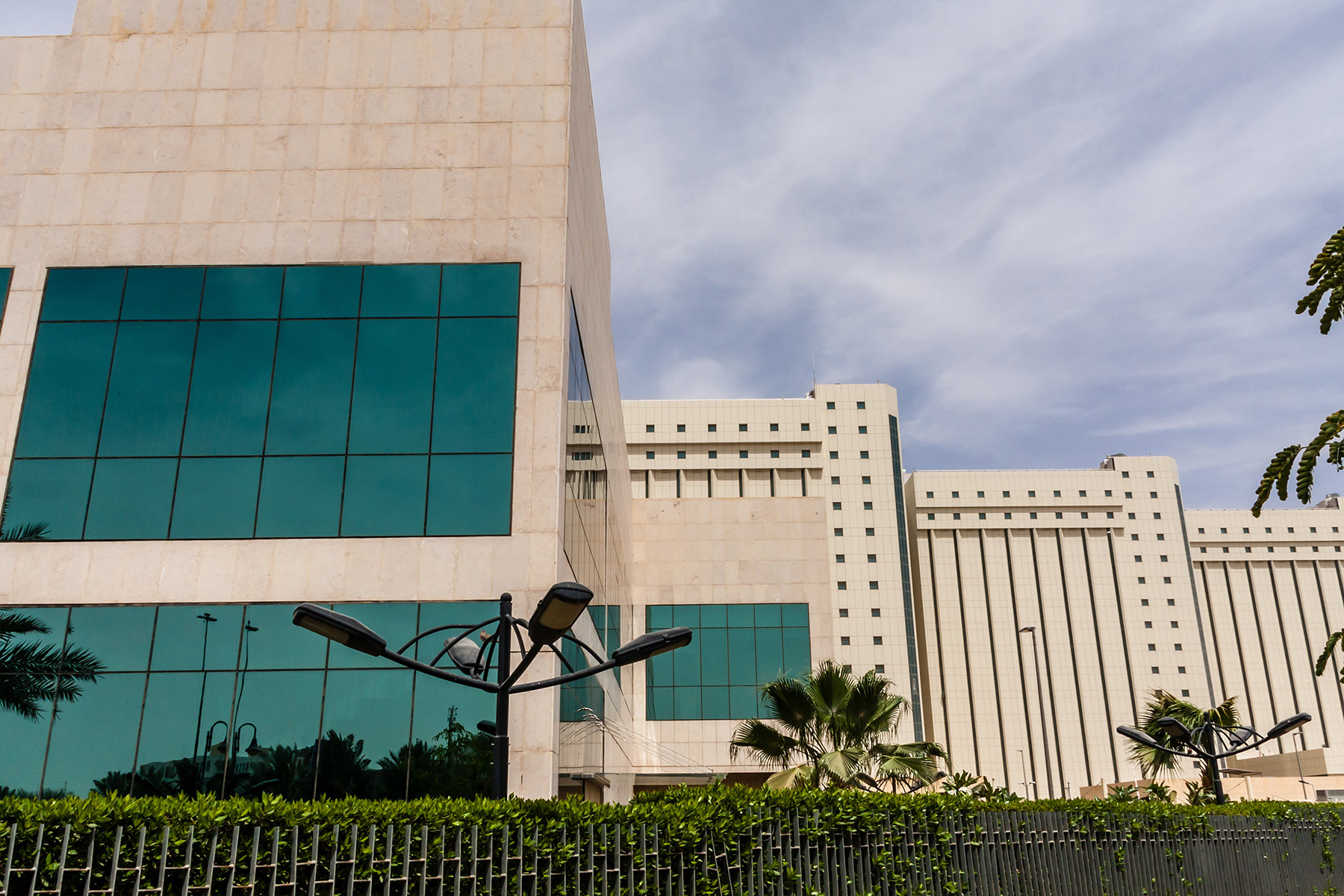Saudi Arabia’s healthcare system offers both public and private options, but not everyone has automatic access. Citizens and GCC nationals can usually just walk into a clinic and see a doctor. But if you’re an expat from elsewhere, you’ll need private insurance to get medical treatment.
Continue reading for more on the following:
Cigna Global
Enjoy peace of mind while living in Saudi Arabia with Cigna Global’s long-term international health insurance plans (12+ months). Get tailored coverage, direct billing with many providers, complex case management, and global care on demand, with access to a network of 1.5+ million doctors, specialists, and therapists.
Health insurance in the Saudi healthcare system
Saudi Arabia has a universal healthcare system that is accessible through both public and private coverage. Public coverage includes most essential treatments, including doctor visits and hospital care.
Unfortunately, though, the public system is not available to expats from outside the Gulf Cooperation Council (GCC – Bahrain, Kuwait, Oman, Qatar, and the UAE). Instead, these foreign nationals must take out private health insurance (التأمين الطبي).

The Ministry of Health (MOH – وزارة الصحة) regulates public health in Saudi Arabia and sets the country’s long-term health strategies. It also oversees the Council for Health Insurance (CHI – مجلس الضمان الصحي), which supervises the mandatory health insurance system for expats in Saudi Arabia.
Who needs health insurance in Saudi Arabia?
Before we dive into the nitty-gritty, here’s a quick overview of who needs what kind of health insurance (applies to non-GCC citizens):
| What’s your status? | Do you need private health insurance? |
| Employees | Only if you want 100% coverage |
| Investors and other premium residents | Yes |
| Job seekers | Yes |
| Students | Yes |
| Pensioners | Yes |
| Asylum seekers and refugees | It depends on your individual situation |
Salaried workers and freelancers
Saudi employers hiring foreign workers are legally required to provide them with private health insurance. This also applies to Saudi households that employ more than four domestic workers. Expat freelancers must arrange for private insurance on their own accord.
It’s worth noting that employers typically provide basic insurance plans, so your co-payments – or out-of-pocket payment for specialized treatment – may be high. As such, you may want to look into getting private (top-up) insurance to ensure 100% coverage.

Investors and other premium residence visa holders
If you are in Saudi Arabia on a premium residency visa, you and your relatives must take out private health insurance for the duration of your permit. Investors, entrepreneurs, and real estate owners can choose their own insurance plan, while special talent may be supplied with health insurance by their employers.
(Unemployed) job seekers with or without an income
When you are a foreign job seeker who has come to Saudi Arabia to look for work, you have a couple of options for health insurance:
- Expats from the GCC can access public healthcare using their own country’s health benefits
- Expats from elsewhere must purchase Saudi visitors’ health insurance as part of their visa application
Health insurance for children and students
Saudi children have access to free healthcare, while expat children are automatically covered by their parents’ or guardians’ health insurance. Private insurers in Saudi Arabia typically allow boys to remain insured as dependents until they are 25, provided they are unmarried and unemployed. There is no age limit for girls, though they have to stay unmarried and unemployed.
International students can either:
- Access public healthcare if they are from the GCC
- Take out private health insurance if they are from elsewhere
Health insurance for retired pensioners
Retired seniors must have private health insurance to cover their medical expenses. Like premium residency visa holders, pensioners can choose any insurance plan they wish.

Short-term visitors and tourists
Tourists visiting Saudi Arabia from a visa-exempt country don’t need health insurance to enter the Kingdom. However, it’s a good idea to have travel health insurance, just in case. Saudi medical care is high-quality, but can be expensive if you have to pay for it yourself.
If you need a visa to enter Saudi Arabia, you must purchase mandatory visitor medical insurance as part of the application process.
Asylum seekers and refugees
Saudi Arabia has not signed the 1951 UN Refugee Convention and does not officially recognize or register refugees. So, any person seeking asylum in the country is typically subject to general immigration laws. In other words, they are expats who must have a visa and private health insurance.
Of course, when you’re fleeing a situation in your home country, applying for a visa is the last thing on your mind. As a result, refugees are often undocumented and likely unable to get proper coverage.
That said, emergency medical care is generally accessible to all people in Saudi Arabia, including undocumented asylum seekers. Routine healthcare may be available through humanitarian assistance, non-governmental organizations, or out-of-pocket payments.
How does public health insurance work in Saudi Arabia?
Many countries have public health funds that pay for medical care. Eligible patients would need to register and make social security contributions to access public health treatments.
However, that’s not the case here. Saudi citizens and GCC nationals just have to prove their nationality, and all is sorted. In other words, they can typically get medical help by just showing up.
Can foreigners get public health insurance in Saudi Arabia?
Yes and no. GCC citizens can access public insurance; those from elsewhere cannot.

What does public health insurance cover in Saudi Arabia?
Saudi Arabia’s public health system is quite comprehensive and covers a range of essential services, including doctor visits, basic dental care, vaccinations, prescription medication, and hospital and emergency care.
Services and treatments that are typically excluded or not fully covered include complex dental procedures, vision and hearing aids, long-term rehabilitation and elderly care, Islamic Medicine, elective and cosmetic procedures, and medical help abroad.
Overview of private health insurance in Saudi Arabia
While private health insurance is mandatory for most foreigners in Saudi Arabia, having this residency requirement isn’t all that bad. Private health facilities often have shorter waiting times, more specialized treatments, and higher levels of comfort and luxury.
The country has many insurers that cater to students, working parents, pensioners, and others, as well as internationals with global coverage and special English- or other foreign language services. For those looking for global insurance specifically catered to expats, look no further than APRIL International.
APRIL International
Looking for expat-friendly health insurance in Saudi Arabia? APRIL International has a long history of providing health coverage tailored to the unique needs of the expat lifestyle, ensuring peace of mind for you and your family. Whether you’re relocating to Saudi Arabia or simply staying short-term, APRIL International has the right policy for you.
Advantages of private health insurance in Saudi Arabia
As mentioned before, private health insurance covers non-emergency care for non-GCC expats in Saudi Arabia. But Saudi nationals could also benefit from private insurance. For example, health insurance comes with:
- No copayments
- English-speaking staff
- Additional coverage for non-essential treatment (e.g., Islamic Medicine)
- Wider range of healthcare providers who offer personalized care
- Premium levels of luxury and comfort (i.e., private rooms) in hospitals
- Faster access to better and more efficient medical care
- Sickness and funeral benefits
- Coverage abroad
How to apply for private health insurance in Saudi Arabia
With the number of health insurance options in Saudi Arabia, it makes sense to look around and compare plans. Aside from the affordability, things you could consider include:
| Consideration | Questions to ask |
| Does the policy suit your needs | Are you able to select what you need and remove what you don’t? |
| Payment process | Will your insurer settle bills directly, or do you have to pay first and then claim reimbursement? How complicated and/or time-consuming is the process? |
| Special offers and incentives | Can you get a discount on your premium by signing up for a certain plan? Does the insurer offer reward programs? |
| Overseas coverage | Is travel insurance offered, and do you need it? |
| Customer feedback | How does the company score on consumer ratings websites? |
| Cancellation policy | How easy is it to change to another provider? Will you have to pay to cancel? |
Be sure to ask your employer about their health insurance policy as well; you may be able to sign up with a company discount.
Once you’ve decided on a plan, you can contact the insurance company directly to sign up. They will be more than happy to walk you through the process. Beware of pushy salespeople, though! You might walk away with a completely different policy than you had in mind.

How to get money back from health insurance
Private insurance policies in Saudi Arabia vary substantially in price. This means that some of the more affordable ones might not be accepted at the larger, more popular, or reputable hospitals and clinics. Always check with your insurance provider what’s covered before booking an appointment.
If your insurer has contracted the health service, they may settle the medical bill directly, without you having to pay first. In other cases, however, you may need to pay the bill upfront and ask for reimbursement afterward.
Double-check with the insurance company to see what their reimbursement policy is. Most allow you to scan or take a photo of the bill and upload it online. Others require you to send in the original invoice on paper.
How much does Saudi health insurance cost?
Is public health insurance in Saudi Arabia free?
Yes, public healthcare is free for Saudi citizens.
How much is private health insurance in Saudi Arabia?
When it comes to private health insurance, most insurers in Saudi Arabia have different policy levels, ranging from basic to comprehensive. Premiums usually depend on:
- Extra coverage (e.g., dental care or hospitalization)
- Coverage location (i.e., whether the policy covers abroad)
- Personal information, such as age and health conditions
Depending on the extra coverage, you can expect to pay around SAR 3,000–5,000 per year for basic insurance plans. For more comprehensive coverage, prices start from SAR 7,500 upwards.
Again, it’s always smart to research and compare insurance policies to get the best healthcare coverage.
Useful resources
- Ministry of Health – official government website for the ministry responsible for healthcare in Saudi Arabia
- Council of Health Insurance – official government website with information on health services in Saudi Arabia








